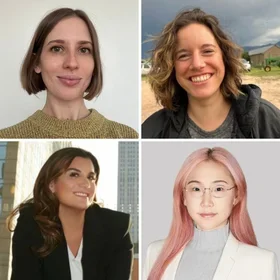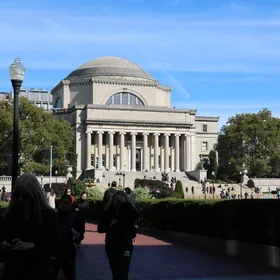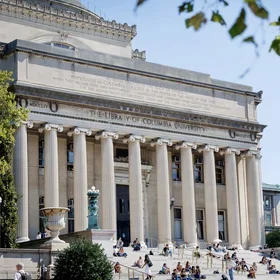“Are we leading the technology, or is the technology leading us?” With these words, Deputy Program Director Jesse Scinto (’12SPS, Strategic Communication) kicked off Columbia University’s second annual Strategic Communication Winter Symposium. At a time when generative AI is poised to dramatically alter the profession, the symposium focused on the human capacities needed to shape the future of the discipline.
Program Director Kristine Billmyer, Ph.D., challenged attendees to consider the critical role communication plays in democratic societies. “How will we not only shape the future of strategic communication but shape the future through strategic communication in favor of a just, sustainable future?”
Launched in 2023, the Winter Symposium has become the Strategic Communication program’s flagship event for thought leadership and industry engagement, drawing nearly 200 attendees, including students, faculty, alumni, and speakers.
Melissa Fleming, U.N. under-secretary-general for global communications, gave the keynote address, emphasizing the need for strong information ecosystems and even stronger storytelling in an era of mis- and disinformation. “Facts are not enough,” she said. “If we give people only the facts, they won’t shed a tear and won’t lift a finger.”
Fleming, author of A Hope More Powerful Than the Sea, which recounts the harrowing ordeal of Syrian refugees, called for communicators to be guided by the “three W’s”: what, why care, and what now. “Once you get them to care, you have to be there with the ‘What now?’ ”
View Fleming’s “A Vision for Strategic Communication in the Post-Truth Era” keynote address.
Strategic Communication lecturer Mark Truss led an industry panel on “How to Be a Futurist.” Truss, who is also chief research officer of advertising agency VML, asked panelists what it means to be a futurist and how communicators can develop a futures practice.
“We need to move out of being trend-watchers and into being advocates toward the future we want to see,” said Chris Perry, Weber Shandwick Futures chairman and author of Perspective Agents: A Human Guide to the Autonomous Age.
Emma Chiu, global director of VML Intelligence, said that successful prediction depends on both rigorous market research and an ability to persuasively frame findings. “You need to be very good at storytelling in a way that is accessible to the audience.”
Sree Sreenivasan (’93JRN, Columbia University), CFO and cofounder of Digimentors, struck a cautionary chord for futurists, noting how long it can take for some innovations to gain acceptance. He recounted how Wikipedia was once viewed with widespread skepticism but is now recognized as one of the more reliable sources on the internet.
“If you went back and tried to predict how Wikipedia will work, you will be wrong in every way,” he said.
View “How to Be a Futurist” panel.
The afternoon sessions focused on leadership development, beginning with an Advisory Board Roundtable, which featured members of the Strategic Communication Advisory Board. Formed in 2023, the Advisory Board helps ensure program relevance by providing curriculum guidance and access for students.
Susan Betts, former senior director of brand strategy at Google, moderated a discussion centered on core competencies for rising communicators. She was joined onstage by Cameron Batten, SVP and chief communications officer for the Volkswagen Group of America; Jason Cone, chief public policy officer at the Robin Hood Foundation; Amanda Muñoz (’11SPS, Strategic Communication), VP in marketing at The Wall Street Journal; and Margenett Moore-Roberts, principal consultant with the Moore-Roberts Group.
Panelists stressed the need for clear messaging, knowing your brand, and having social media strategies that evolve over time. Recalling the recent launch of Crayola’s “Colors of the World” crayons, designed to include diverse skin tones, Moore-Roberts noted, “There’s a way for us to have a more holistic, more robust, more dynamic narrative.”
“What you put out in the world, it matters,” said Moore-Roberts. “You can set the tone for the future.”
The day concluded with “Stories of Courage and Change,” an hour devoted to compelling personal narratives shared by current Strategic Communication students. Yajing (ChiChi) Wang (’24SPS) spoke of professional and personal challenges following geopolitical tensions that affected her career. Randa Albattal (’24SPS) described moving from Saudi Arabia to England as a child and the challenges of adapting to a new culture. Others spoke on topics including educational opportunities for girls, the challenges of life as an artist, and how an aversion to math led to a job as a math tutor.
These stories highlighted the resilience of students, providing inspiration for the rest of us to face (and shape) the future of strategic communication.
About the Program
The business world’s around-the-clock communication challenges are demanding a new level of strategic thinking. Columbia University’s Master of Science in Strategic Communication graduates emerge equipped with all the essential skills and tools for a successful career in a wide range of communication fields.


